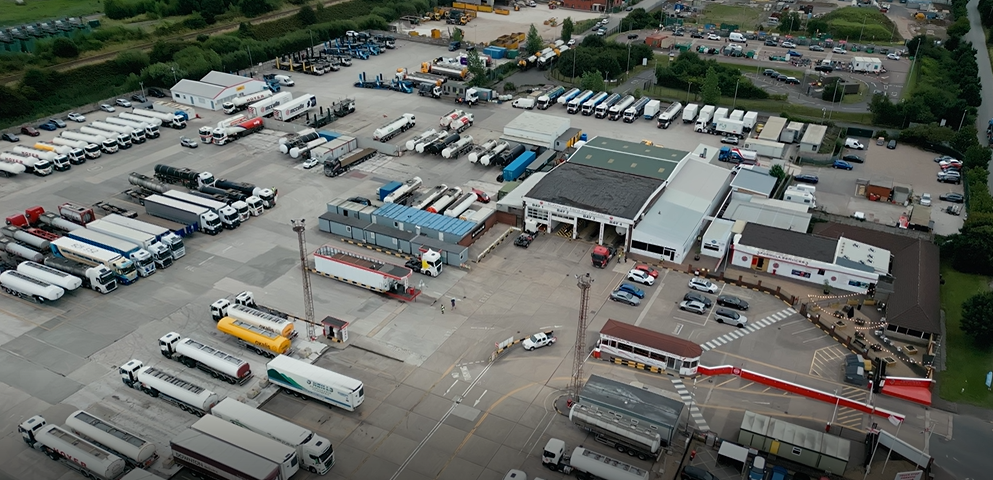
Susie Jones
Wie kann das Transportgewerbe die psychische Gesundheit der Fahrer unterstützen?
Erstellt: 07.10.2024
•
Aktualisiert: 10.10.2024
44 % der Lkw-Fahrer im Fernverkehr leiden unter depressiven Symptomen - die psychische Gesundheit im Transportgewerbe wird jedoch oft übersehen. Die Art des Berufs spielt eine entscheidende Rolle für das Wohlergehen der Fahrer, die lange Stunden auf der Straße und lange Zeiten der Isolation verbringen müssen. Anlässlich des Tages der psychischen Gesundheit am 10. Oktober stellt sich die Frage, wie Fahrer und die Branche für ihr Wohlergehen sorgen können.
Wie können Autofahrer auf ihre psychische Gesundheit achten?
Autofahrer können verschiedene Maßnahmen ergreifen, um auf ihre psychische Gesundheit zu achten:
Schlaf und Ruhe
Ausreichender Schlaf ist wichtig für die körperliche und geistige Gesundheit. Als Lkw-Fahrer können lange Arbeitszeiten hinter dem Lenkrad einen regelmäßigen Schlafrhythmus stören - die Einführung einer Routine verbessert die Stimmung, die Wachsamkeit und das Wohlbefinden des Fahrers.
Flüssigkeitszufuhr und Ernährung
Auch wenn es unterwegs schwierig ist, ist es wichtig, sich ausgewogen zu ernähren und ausreichend Flüssigkeit zu sich zu nehmen, um Energieabfälle und Stimmungsschwankungen zu vermeiden.
Stressbewältigung
Zum Beruf des Lkw-Fahrers gehört es, mit Stresssituationen umzugehen - Stressbewältigungstechniken wie Zeitmanagement und Entspannungsübungen reduzieren das Stressniveau wirksam. Achtsamkeitsübungen wie Meditation und tiefes Atmen helfen, eine ruhige Einstellung zu bewahren.
Körperliche Bewegung
Regelmäßige Bewegung ist wichtig für die körperliche und geistige Gesundheit. Einfache Übungen wie Gehen, Radfahren oder Dehnen setzen Endorphine frei und heben die Stimmung. Erfahren Sie [wie Sie unterwegs gesund bleiben] (https://snapacc.com/newsroom/how-to-be-a-healthy-truck-driver/).
Reden
Lkw-Fahren ist ein isolierender Beruf, bei dem die Fahrer stundenlang mit niemandem sprechen können. Der Kontakt zu Freunden, Familienangehörigen und Kollegen durch Telefonate und Videochats bietet Unterstützung und wirkt dem Gefühl der Einsamkeit entgegen. Truckstops bieten Fahrern eine gute Gelegenheit, sich mit Gleichgesinnten über die Strapazen des Berufs auszutauschen.
Pausen machen
Längere Zeit hinter dem Steuer zu sitzen, kann psychisch anstrengend sein - regelmäßige Pausen zum Ausruhen und Auftanken verringern den Stresspegel. Für Fahrer gelten strenge Vorschriften für regelmäßige Pausen - erfahren Sie mehr über [Fahrtenschreiberregeln und -vorschriften] (https://snapacc.com/newsroom/tachograph-rules-made-easy/).
Was die Fahrer sagten
Wir haben Autofahrer in den sozialen Medien gebeten, uns mitzuteilen, wie sie sich um ihre psychische Gesundheit kümmern:
Truck Life GB erklärt, dass er "andere Fahrer über meine Social-Media-Plattformen unterstützt. Mein Posteingang ist immer offen für einen Chat. Ob es sich um ein bisschen Geplänkel oder ein allgemeines Gespräch handelt, es sind die kleinen Dinge, die viel bewirken.
"Podcasts und ein paar tolle Kumpels, die alle Höhen und Tiefen kennen, so wie ich mit ihnen. Mindestens einer von ihnen wird einen schlechteren Tag haben als du", erklärt Trucker Mark.
Der Textdienst "Be A Mate" von Mates in Mind ermöglicht es Autofahrern, rund um die Uhr mit geschulten Freiwilligen zu sprechen, wenn sie sich selbstmordgefährdet, ängstlich oder überfordert fühlen. Der Dienst ist anonym und taucht nicht auf der Telefonrechnung auf. Alles, was Autofahrer tun müssen, ist, "BeAMate" an 85258 zu senden, um das Gespräch zu beginnen.

Was können Fuhrparkunternehmen tun?
Fuhrparkmanager können verschiedene Maßnahmen ergreifen, um sicherzustellen, dass ihre Fahrer auf ihre psychische Gesundheit achten. Die Förderung eines Umfelds, in dem Diskussionen über psychische Gesundheit offen und unvoreingenommen geführt werden, kann Meinungen und Stigmata verändern.
Flotten können die folgenden Schritte unternehmen:
Arbeitsbelastung
Wenn möglich, kann eine Verringerung der Arbeitsbelastung des Fahrers das Wohlbefinden des Fahrers erheblich verbessern.
Unterstützung
Ein regelmäßiger Austausch mit den Fahrern ermutigt zu ehrlichen Gesprächen. Wenn Sie den Fahrern ein Unterstützungssystem zur Verfügung stellen, fühlen sie sich nicht allein.
Kommunikation
Eine wirksame Kommunikation über alle organisatorischen Veränderungen wird den Stresspegel der Fahrer senken.
Kultur
Förderung einer positiven Arbeitskultur, die Konflikte und inakzeptables Verhalten vermeidet.
Was können Lkw-Haltestellen für die psychische Gesundheit der Fahrer tun?
Lkw-Fahrer sind zur Deckung ihrer täglichen Grundbedürfnisse auf Raststätten angewiesen. Sie sind für die Verbesserung der psychischen Gesundheit der Fahrer von entscheidender Bedeutung, da sie als Zufluchtsort für Fahrer dienen, die lange, einsame Stunden hinter dem Steuer verbracht haben. Modernste, saubere Einrichtungen, gesundes Essen und ein Ort, an dem man sich treffen kann, bieten den Fahrern die Möglichkeit, sich zu entspannen und zu erholen.
Raststätten können die Gemeinschaft fördern, indem sie soziale Aktivitäten und Veranstaltungen organisieren, bei denen die Fahrer mit Gleichgesinnten in Kontakt kommen und das Gefühl der Isolation abbauen können.
Wie hat sich der Fahrermangel auf die psychische Gesundheit der Fahrer ausgewirkt?
Im Jahr 2023 gibt es in Europa über [230.000] (https://www.iru.org/resources/iru-library/europe-truck-driver-shortage-report-2023#:~:text=Europe%20has%20over%20230%2C000%20unfilled,due%20to%20driver%20retirements%20alone.) unbesetzte Stellen für Lkw-Fahrer - ein Mangel dieser Größenordnung erhöht den Druck auf diejenigen, die bereits in der Branche tätig sind.
Die Zunahme des elektronischen Handels hat diesen Druck noch verstärkt - die Lkw-Fahrer müssen engere Liefertermine einhalten und größere Mengen an Waren abfertigen. Die erhöhte Arbeitsbelastung und der zusätzliche Druck haben sich erheblich auf das Wohlbefinden der Fahrer ausgewirkt - die Fluktuationsrate ist so hoch wie nie zuvor.



